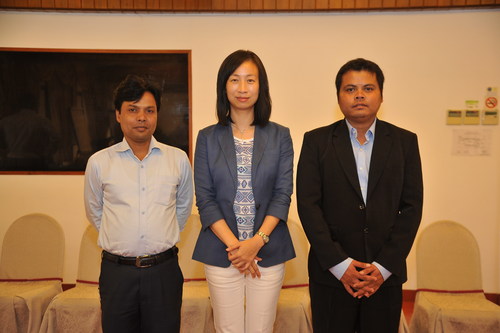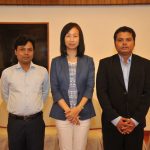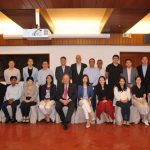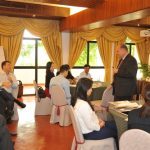 IFT President with the two representatives from tourism authorities of Myanmar and Bangladesh, nominated by UNWTO.
IFT President with the two representatives from tourism authorities of Myanmar and Bangladesh, nominated by UNWTO.
In order to provide diversified and advanced training opportunities for industry professionals and enhance management capabilities of the local service industry, Institute for Tourism Studies (IFT) and Lausanne Hospitality Consulting, which is jointly run by Ecole hôtelière de Lausanne (EHL) and Swiss Hotel Association Company, co-orgainsed an Executive Development Programme on Strategic Resilience on 24 and 23 August. The programme attracted 18 professionals of hotels and mega resorts. Two representatives from tourism authorities of Myanmar and Bangladesh, nominated by UNWTO, attended the programme, namely Mr. Nyan Myat Min, Assistant Director, Directorate of Hotels and Tourism, Ministry of Hotels and Tourism, Myanmar, and Mr. A K M Rafiqul Islam, Executive Officer, Bangladesh Tourism Board, Ministry of Civil Aviation and Tourism of Bangladesh. IFT is an affiliate member of UNWTO since 1997, and have established a long-term cooperation relationship with UNWTO. In 2012 an agreement between IFT and UNWTO was signed, with the objective to enhance the cooperation and knowledge exchange. Through the programme, participants learned how to identify and overcome the challenges of the world today by developing their strategic leadership skills. Besides, they were equipped to anticipate strategy decay and plan for resilience by business process reengineering and innovation. Programme topics include: • Key aspects of reinventing the business model • Elements of a successful business model • Difference between growth and value creation • Tips for successfully implementing strategic resilience in small-and-medium- sized enterprises IFT had the honour of inviting Prof. André Mack as the facilitator of this programme. Prof. Mack is the Director at Lausanne Hospitality Consulting and a faculty member for EHL Executive Education, lecturing on project management and consulting. He has extensive experiences in the in-flight catering industry and management consulting. He is specialised in the areas of strategic marketing, customer service and business process reengineering. As the tourism and hospitality industry is growing swiftly in Macao, the demand for knowledgeable professionals is increasing and thus hotel management needs to upgrade themselves to cope with the changing market trends. IFT is always striving to enhance its teaching and research so as to contribute to the tourism industry and the society. By organising seminars and workshops, IFT constantly shares with the industry the most updated information and research findings about the future development of Macao’s tourism industry and ways to enhance it. Established in 1995, the Institute for Tourism Studies, Macao (IFT) offers the most extensive selection of tourism and hospitality related bachelor degree programmes in Macao, and about twenty thousand participants attend its vocational and professional training courses annually. IFT collaborates with 97 universities and tourism organisations around the world, and builds strong links with 500 leading tourism and hospitality corporations to offer internship opportunities to its students. Being the first institution accredited by the UNWTO.TedQual Certification System for tourism education, IFT has now 7 bachelor degree programmes with the Certification. Currently, the Institute has the most number of bachelor degree programmes certified under the System of any tertiary education establishment worldwide. IFT has received the Medal of Merit in Tourism from the Macao SAR Government, and won twice the Gold Award in ‘Education and Training’ from the Pacific Asia Travel Association (PATA).
View gallery



